中西方宗教文化差异_(英文)
中西文化差异英文
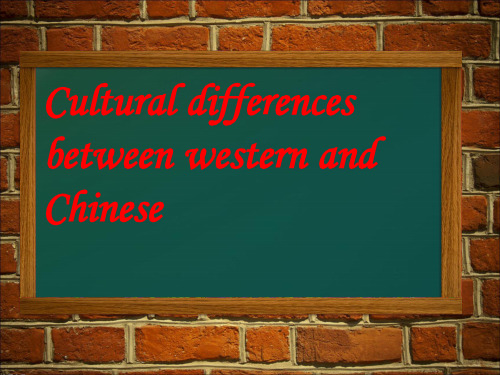
• Suggestions • Different countries
have different cultures • Fully understand and respect when municating with people from different countries
• An western hostess is likely to say; Oh; I am so glad that you liked it I cook it especially for you
• A Chinese hostess will apologize for giving you Nothing She will sayI just made some dishes casually and they are not very tasty
relationship
Living style
• Chinese prefer getting up early and sleep early too We usually go home early and cook meals
• We often work during the holidays We like save money and when we have enough money; we then go and buy what we want; in my opinion; Chinese are so tired and busy;
• Western education is more interesting Teachers pay attentions to training students skills in thinking in realistic life not to emphasis on the importances of memories
中西文化差异英文版
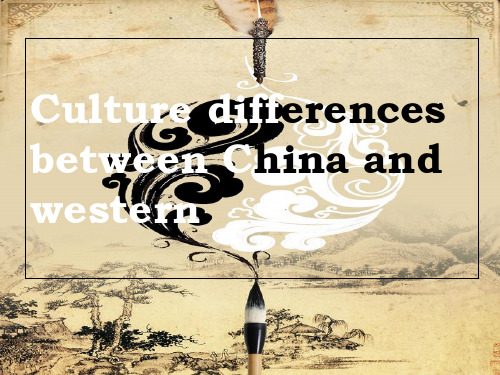
Cooking skills
Differences in wedding
Differences in painting
Differences in education
Chinese education
Western education
Teaching style
The standard of evaluating
But in most west countries; people live in a easy and happy
lives They get up late and go to work late too; they go to pubs; bars to have a rest after they finish their work; they enjoy their holidays; they seldom go to work during the weekend if you go to west countries; you can take part in their joyful night life
Culture differences between China and western
As we all know that
there are many
differences between
The culture
China and
includes many
Western;and I think the things;such as
Differences in thinking
ห้องสมุดไป่ตู้
THANKS
Differences in living style
中西方文化差异英文
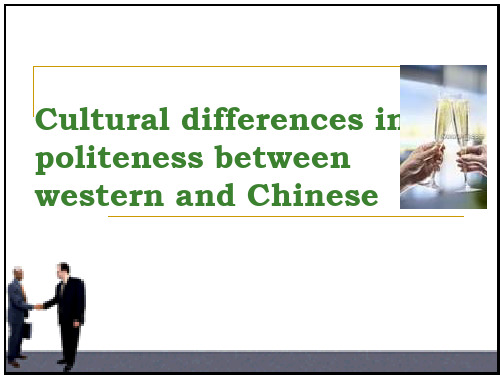
Something about western families
Western families advocate equality in daily life. The husband and the wife usually have an equality voice in decision-making, and on certain matters, the children, too, have a vote.
Different cultural factors may result in cultural differences.
1.Cultural Background 2. Different values 3.Individualism and
Collectivism 4. Family 5.Nationalism
In a formal setting, westerners address men as "Mister" (Mr), married women as "Misses" ("Mrs."), and unmarried women as "Miss" ( "Ms."). These days many women prefer to be addressed using the abbreviations "Ms." , pronounced "miz".
An western hostess is likely to say,” Oh, I am so glad that you liked it. I cook it especially for you.”
中西方文化差异英文版
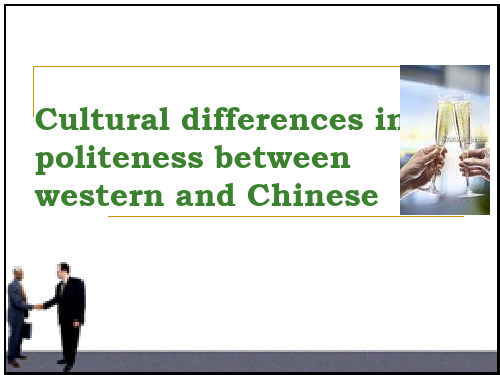
In west, Although they are different in age and status, they can call the other directly, namely, their names, even first names .They demonstrate the sense of intimacy and the conception of” Everyone is created equal”
Cultural differences in politeness between western and Chinese
1.Greeting and Parting
• In China, When people meet acquaintances or friends, we always say ,“Have you eaten yet?” What are you going to do?”
pliments and Response
For example, if a hostess is complimented for her cooking skill ,how she will response in west and china?
East&West
A Chinese hostess will apologize for giving you “Nothing”. She will say“I just made some dishes casually and they are not very tasty.”
4. Thanks and Responses
In China,“Thank you” is not frequently used between intimate friends and family members because it may imply a certain distance between the addresser and the addressee.
中美宗教文化比较(英文版)
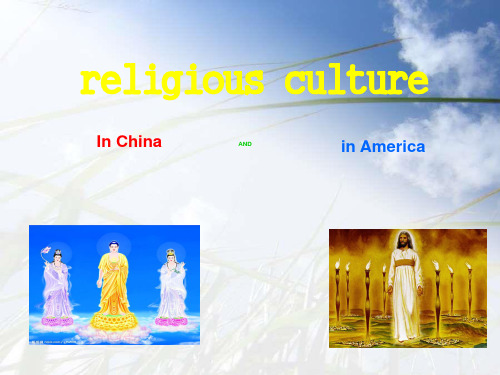
Harvard University
Yale University
Princeton University
the effects of religion on American movies
• A common phenomenon we always see in the American movie is that the hero often considers himself as a savior. So as the country. The United States often invade other countries in the name of helping and improving. All of these come from their religion, Puritanism(清教主 义). Furthermore, it contributed to the hegemony (霸权主义)of the United States to some degree.
Various American presidents have often stated the importance of religion. On 20 February 1955, President Dwight D. Eisenhower stated that "Recognition of the Supreme Being is the first, the most basic, expression of Americanism." President Gerald Ford agreed with and repeated this statement in 1974.
中西方宗教文化差异 (英文)

以老庄学说之“道”为最高教义的中国土生土长的宗教。
In Taoism's "Tao" as the supreme doctrine of China's
native religion.
Since the beginning of the Yellow Emperor Xuanyuan
道
given surnames, since about 4700 history (Tao Li).
Religious taboo (宗教禁忌)
*Buddhism - diet taboo: one is not eating meat, including all animal
food and onions, garlic, leek and other spices food; two is not drinking. 佛教饮食禁忌;一是不吃荤,“荤”包括一切动物性食品和葱、蒜、 韭等辛香味食物;二是不饮酒
The origin of the religious
基督教Christian
Christianity originated in the year first Century, is one of the most number of religious belief the world. 基督教起源于公元1世纪,是世界上信仰人数最多的宗教 之一。 The Christian faith to Jesus Christ as Savior religion. 基督教是以信仰耶稣基督为救世主的宗教。 Including the Catholic, Orthodox, three Protestant sect. 包括天主教、东正教、新教三大教派分支。 The canon of Christianity is the "Bible". The characteristic is equality fraternity. 基督教的经典是《圣经》。特点是博爱、人人平等。
中西方文化差异 英文版
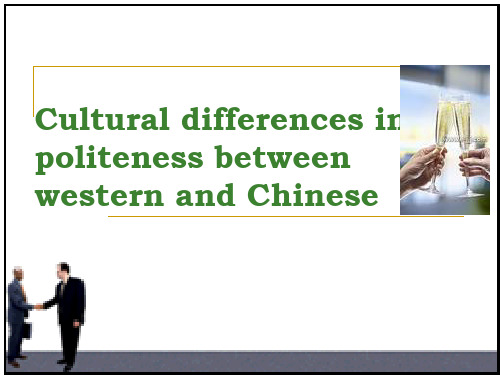
2..Addressing
In China, the surname comes first and then the given name.
While westerners names are written and spoken with the given name first and the family name last.
Different cultural factors may result in cultural differences.
1.Cultural Background 2. Different values 3.Individualism and
Collectivism 4. Family 5.Nationalism
An western hostess is likely to say,” Oh, I am so glad that you liked it. I cook it especially for you.”
What we can see from it?
The Americans are “straight forwardness”, the Chinese take pride in “modesty”. In the response to compliments. Chinese are tend to efface themselves in words or refuse it, although they do feel comfortable about the compliments.
In an informal situation, westerners will introduce each other by first name, without titles, and occasional ly by just the last name.
谈谈中西方文化差异用英语写作文
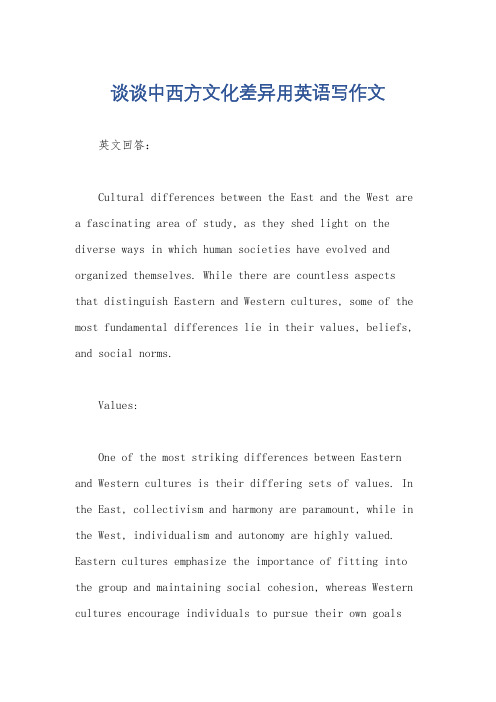
谈谈中西方文化差异用英语写作文英文回答:Cultural differences between the East and the West are a fascinating area of study, as they shed light on the diverse ways in which human societies have evolved and organized themselves. While there are countless aspects that distinguish Eastern and Western cultures, some of the most fundamental differences lie in their values, beliefs, and social norms.Values:One of the most striking differences between Eastern and Western cultures is their differing sets of values. In the East, collectivism and harmony are paramount, while in the West, individualism and autonomy are highly valued. Eastern cultures emphasize the importance of fitting into the group and maintaining social cohesion, whereas Western cultures encourage individuals to pursue their own goalsand desires.Beliefs:Another fundamental difference lies in the religious beliefs and spiritual practices that prevail in each region. Eastern cultures are heavily influenced by Easternreligions such as Buddhism, Confucianism, and Taoism, which emphasize concepts of karma, reincarnation, and the interconnectedness of all things. Western cultures, on the other hand, are rooted in the Judeo-Christian tradition, which places a strong emphasis on monotheism, personal salvation, and the separation between humans and God.Social Norms:The social norms and customs that shape daily life in Eastern and Western cultures also differ significantly. In the East, there is a strong emphasis on respect for authority, hierarchy, and tradition. Individuals are expected to conform to social expectations and avoidcausing shame to their family or community. In the West,social norms are more egalitarian, and individuals are encouraged to question authority and express their own viewpoints.Communication:Communication styles also vary between Eastern and Western cultures. In the East, communication tends to be indirect and implicit, with a focus on non-verbal cues and subtle hints. In the West, communication is often more direct and explicit, with a strong emphasis on clarity and efficiency.Time Perception:Another notable difference is in the way that Eastern and Western cultures perceive time. Eastern cultures tend to view time as cyclical and fluid, while Western cultures view it as linear and finite. This difference can manifest in various aspects of life, such as attitudes toward work, leisure, and personal relationships.These are just a few examples of the countless cultural differences that exist between the East and the West. These differences shape everything from the way that people interact with each other to the way that they view theworld around them. Recognizing and understanding these differences is crucial for fostering mutual respect and cooperation between cultures.中文回答:文化差异。
- 1、下载文档前请自行甄别文档内容的完整性,平台不提供额外的编辑、内容补充、找答案等附加服务。
- 2、"仅部分预览"的文档,不可在线预览部分如存在完整性等问题,可反馈申请退款(可完整预览的文档不适用该条件!)。
- 3、如文档侵犯您的权益,请联系客服反馈,我们会尽快为您处理(人工客服工作时间:9:00-18:30)。
在英语中,宗教Religion一词源于拉丁语中的Religio, 意指“连接”。
古罗马哲学家西塞罗(M. T. Cicero, 前106-43年) 在其著作《论神之本性》中使用了拉丁文relegere, 意指在敬神行为上的“集中”和“注意”,与现代 宗教的含义挂上了钩。同时他还使用动词religere, 指在神灵崇拜上的严肃认真。 古罗马神学家奥古斯丁在《论真宗教》及《论灵魂 的数量》皆用过Religare,代表人、神与灵魂间的 重新结合,以人神联盟说明人与神之间的密切关系。 奥古斯丁又在《订正》及《上帝之城》中使用Reeligere来表示人在信仰上的重新抉择及决断,人需 要靠重新考虑和选择与神修好。故Religio一词在拉 丁语的原意应为人对神圣的信仰、义务和崇拜,以 及神人之间的结合修好。
以老庄学说之“道”为最高教义的中国土生土长 的宗教。
In Taoism's "Tao" as the supreme doctrine of China's native religion. Taoism takes Huang Di as the ancestor Xuanyuan, Lao for ancestor, Zhang Daoling to teach the progenitor。
In Japan
宗教信仰:大多信奉神道教和佛教。 饮食习惯:喜欢吃三种料理,即日本料理 (和食)、中华料理(中餐)、西洋料理(西 餐)。吃菜喜吃清淡,忌油腻,爱吃鲜中带甜的 菜,爱喝酒,爱吃瓜类水果,不爱吃羊肉和猪内 脏。 禁忌:日本人禁忌绿色,忌9和4等数字,日 本妇女忌问其私事。 喜好:仙鹤和龟,认为这是长寿的象征。
In Europe
欧洲国家有着西方人关于数字、颜色、花卉及动 物的许多共同忌讳。 西方人普遍忌讳13 和星期五,其原因都原于 基督教的传说。 通常把黑色作为葬礼的表示 一般不喜欢菊花、杜鹃花以及黄色的花。 一般不喜欢大象、孔雀、仙鹤等动物
中国佛教寺庙春节期间活动丰富。我国的佛教寺庙通常都 会在春节期间举行祈福、点灯、放生等各种形式的活动, 与信教群众和佛教徒共庆新春。大年初一是弥勒菩萨的诞 辰,弥勒菩萨是未来佛,其笑口常开的形象也让人们一见 就心生欢喜,所以,结合弥勒菩萨诞辰日,全国寺庙都举 行诵经、祈福活动,为整个国家和每个普通人的美好未来 祈祷。此外,春节期间,全国的寺庙还迎来大批信众到寺 内团聚、朝拜、进香,寺内举行点灯活动,还举行放生活 动,向信众倡导保护动物、保护环境、维持人与自然和谐 共存的理念。
The oridhism
Buddhism is the third major religions in the world. 佛教是世界第三大宗教 Buddhism was founded in the sixth Century BC in ancient India, the founder of Gautama Siddhartha。 佛教创始于公元前6世纪的古印度,创始人为乔达摩· 悉 达多。
In Korean
宗教信仰:以信奉佛教为主,佛教徒约占全
国人口的三分之一 饮食习惯:主要以米饭为主,爱吃辣椒、泡 菜。 禁忌:最忌讳4这个数字。
In Malaysia
宗教信仰:大多数人信奉伊斯兰教,并作为国教。
饮食习惯:喜欢吃牛肉,羊肉,饮食口味清 淡,怕油腻,爱吃椰子、椰子油和椰子汁,他们 用椰子油烹调做菜,并用咖喱粉作调料。 禁忌:忌食狗肉、猪肉,忌喝酒,忌会使用 猪皮制品,忌谈猪、狗的话题,他们认为左手不 干净,故不用左手为别人传递东西,忌黄色,不 穿黄色衣服,忌讳的数字是0、4、13。
Religion Cultural Differences of Chinese and Western
中西方宗教文化差异
佛教 伊斯兰教
道教 基督教
在汉语中,宗教本不为一联缀词。宗教的“宗”意为 祖先,“教”意为教化,合起来就是“祖宗之教化”。 《说文解字》:“宗者,尊祖庙也,以宀从示。示者, 天垂象见凶吉所以示人也,从二。三垂,日月星也, 关乎天文以察时变示神事也。”这表示对神及人类祖 先神灵的尊敬和崇拜。 “教”指教育、育化,上师下效,侧重在对神道的信 仰。
Christianity originated in the year first Century, is one of the most number of religious belief the world。 The Christian faith to Jesus Christ as Savior religion.基督教起源于公元1世纪, 是世界上信仰人数最多的宗教之一。基 督教是以信仰耶稣基督为救世主的宗教。 Including the Catholic, Orthodox, three Protestant sect. 包括天主教、东正教、新教三大教派分 支。
道教以轩辕黄帝为始祖、太上老君为道祖,张道 陵为教祖
伊斯兰教Islam
Islam is one of the world's religions. The rise in the seventh Century ad in Arabia peninsula. 伊斯兰教是世界性宗教之一。 兴起于公元7世纪的阿拉伯半岛 。
春 节 祈 福
基督教与圣诞节
圣诞节(Christmas ),译名为“基督弥撒”。弥 撒是教会的一种礼拜仪式。圣诞节是一个宗教节。 因为把它当作耶稣的诞辰来庆祝,因而又名耶诞 节。这一天,世界所有的基督教会都举行特别的 礼拜仪式。每年12月25日,是基督徒庆祝耶稣基 督诞生的庆祝日,在圣诞节,大部分的天主教教 堂都会先在12月24日的耶诞夜,亦即12月25日 凌晨举行子夜弥撒,而一些基督教会则会举行报 佳音,然后在12月25日庆祝圣诞节;而基督教的 另一大分支——东正教的圣诞节庆祝则在每年的 1月7日。
In India
宗教信仰:佛教、印度佛 风俗习惯:回答对方问题时若将头歪一边或 摇头,那是肯定的表示。 禁忌:有"牛的王国"之称,牛是当地最神圣 不可侵犯的动物。在路上驾车时,千万注意不要 撞到牛,更不要佩戴牛制品进入庙宇。
In Africa
大体上分为黑种人和白种人,不要对黑种人直接 称呼"黑人",他们会认为这种称呼是对他们的歧 视、不礼貌。 宗教信仰:黑中大多信仰原始宗教、拜物教; 白种人则以信奉伊斯兰教为主。
宗教是人类社会发展到一定阶段的历史现象, 它既不是从来就有的,也不是永恒的,它有发 生、发展和消亡的过程。对于宗教的起源和形 成,中西方古代宗教的形成有两大来源,一是 源于自然崇拜,二是源于祖先崇拜。可以说是 “在自然神和英雄神升腾并两相混合的同时, 各自独立性也在逐渐形成。自然神和英雄神的 混合及向上界升腾形成至上神”。
子夜弥撒
Thank you!
